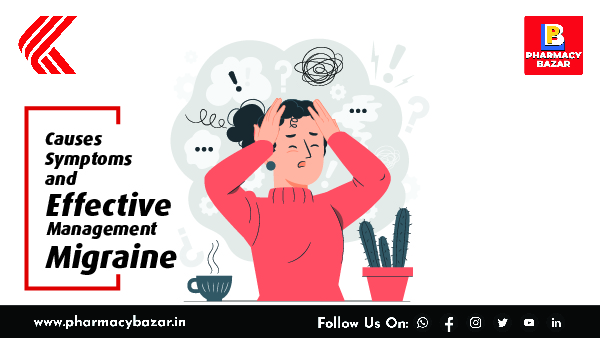Migraine: Causes, Symptoms, and Effective Management Strategies
Aug 16, 2023
Abstract:
Migraine is a prevalent neurological disorder characterized by recurrent severe headaches accompanied by various symptoms. This article discusses the causes, symptoms, and effective management strategies for controlling migraine attacks, providing valuable insights into improving the quality of life for those affected.
Introduction:
Migraine is a complex neurological condition affecting millions of people worldwide. It is known for its debilitating headaches often accompanied by visual disturbances, sensitivity to light and sound, nausea, and vomiting. Migraine attacks can significantly impair daily activities and quality of life. This article aims to explore the causes, symptoms, and effective strategies for managing migraine.
Causes:
Migraine is believed to be caused by a combination of genetic and environmental factors. Neurochemical changes in the brain, such as fluctuations in serotonin levels, play a crucial role in triggering migraine attacks. Triggers can vary among individuals and include stress, hormonal changes, certain foods, lack of sleep, weather changes, and sensory stimuli.
Symptoms:
Migraine attacks often progress through distinct stages. The prodrome phase, occurring hours or days before an attack, may include mood changes, food cravings, and neck stiffness. The aura phase, experienced by some but not all migraine sufferers, involves visual disturbances, tingling sensations, and speech difficulties. The headache phase is characterized by intense throbbing pain, typically on one side of the head. Nausea, vomiting, and sensitivity to light and sound often accompany the headache. The postdrome phase follows the headache and leaves individuals feeling drained and fatigued.
Management Strategies:
Lifestyle Modifications: Identifying and avoiding trigger factors is crucial. Maintaining regular sleep patterns, managing stress through relaxation techniques, and staying hydrated can significantly reduce migraine frequency.
Dietary Changes: Keeping a food diary helps identify trigger foods. Common culprits include aged cheeses, processed meats, chocolate, caffeine, and alcohol. A balanced diet rich in magnesium, riboflavin, and omega-3 fatty acids may also help.
Medications: Over-the-counter pain relievers like ibuprofen and aspirin can provide relief during mild attacks. For severe cases, prescription medications like triptans and ergots are effective in alleviating pain and other symptoms.
Preventive Medications: For frequent and severe migraines, preventive medications such as beta-blockers, anti-seizure drugs, and antidepressants can reduce the frequency and intensity of attacks.
Non-Pharmacological Therapies: Biofeedback, cognitive-behavioral therapy, and acupuncture have shown promise in migraine management by promoting relaxation and stress reduction.
Transcranial Magnetic Stimulation (TMS): This innovative approach involves the use of magnetic pulses to stimulate specific brain regions and prevent migraine attacks.
Conclusion:
Migraine is a complex neurological disorder that can significantly impact a person's daily life. By understanding the causes, symptoms, and effective management strategies, individuals suffering from migraines can gain control over their condition. A combination of lifestyle modifications, dietary changes, medications, and non-pharmacological therapies can help alleviate the frequency and severity of migraine attacks, enhancing the overall quality of life.
DISCLAIMER: This article is the property of Pharmacy Bazar and is protected by copyright laws. The information provided in this article is for educational and informational purposes only and is not intended to be a substitute for professional medical advice, diagnosis, or treatment. Always seek the advice of a qualified healthcare provider with any questions you may have regarding a medical condition. Never disregard professional medical advice or delay in seeking it because of something you have read in this article. The author and publisher of this article do not endorse any specific treatments, procedures, or products mentioned in this article.
Recent Post

Blood Cancer: Early Warning Signs and Diagnosis

Understanding Gallstones: Causes, Symptoms, and Treatment Options

Navigating Diabetes Medications: Benefits and Side Effects

Revolutionizing Cancer Treatment: How Unleashing T Cells' Energy Could Transform Immunotherapy

The Power of Lower Back Stretches: Benefits and Best Yoga Asanas for a Healthy Spine

8 Health Conditions That Could Be Due to Magnesium Deficiency

Unlocking Brain Health: How Lifestyle Choices Impact Cognitive Functions

When Speech Takes a Surprising Turn: Unraveling Foreign Accent Syndrome

The Optimal Time to Take Your Vitamin D Supplement: Insights and Best Practices

Beyond Diabetes: Unveiling the Hidden Health Risks of Insulin Resistance

